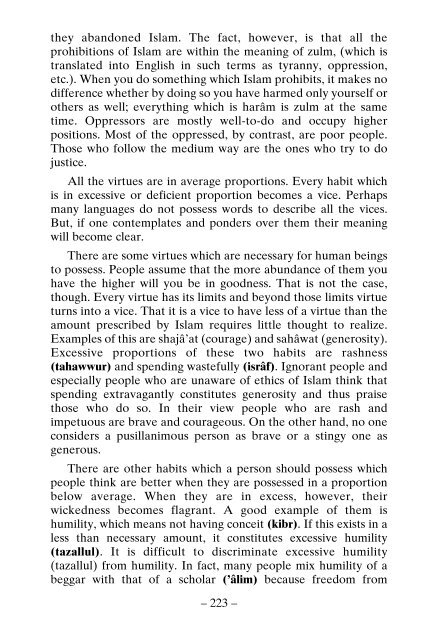Ethics of Islam
Ethics of Islam is taken from the book Berîka by Muhammad Hâdimi. Immorality and ways to get rid of it; 40 depravities and cures to them; usefulness of ethics; what is a soul; strengths of a soul; Personalities emanating from wisdom, courage, chastity and justice are extensively explained.
Ethics of Islam is taken from the book Berîka by Muhammad Hâdimi. Immorality and ways to get rid of it; 40 depravities and cures to them; usefulness of ethics; what is a soul; strengths of a soul; Personalities emanating from wisdom, courage, chastity and justice are extensively explained.
Create successful ePaper yourself
Turn your PDF publications into a flip-book with our unique Google optimized e-Paper software.
they abandoned <strong>Islam</strong>. The fact, however, is that all the<br />
prohibitions <strong>of</strong> <strong>Islam</strong> are within the meaning <strong>of</strong> zulm, (which is<br />
translated into English in such terms as tyranny, oppression,<br />
etc.). When you do something which <strong>Islam</strong> prohibits, it makes no<br />
difference whether by doing so you have harmed only yourself or<br />
others as well; everything which is harâm is zulm at the same<br />
time. Oppressors are mostly well-to-do and occupy higher<br />
positions. Most <strong>of</strong> the oppressed, by contrast, are poor people.<br />
Those who follow the medium way are the ones who try to do<br />
justice.<br />
All the virtues are in average proportions. Every habit which<br />
is in excessive or deficient proportion becomes a vice. Perhaps<br />
many languages do not possess words to describe all the vices.<br />
But, if one contemplates and ponders over them their meaning<br />
will become clear.<br />
There are some virtues which are necessary for human beings<br />
to possess. People assume that the more abundance <strong>of</strong> them you<br />
have the higher will you be in goodness. That is not the case,<br />
though. Every virtue has its limits and beyond those limits virtue<br />
turns into a vice. That it is a vice to have less <strong>of</strong> a virtue than the<br />
amount prescribed by <strong>Islam</strong> requires little thought to realize.<br />
Examples <strong>of</strong> this are shajâ’at (courage) and sahâwat (generosity).<br />
Excessive proportions <strong>of</strong> these two habits are rashness<br />
(tahawwur) and spending wastefully (isrâf). Ignorant people and<br />
especially people who are unaware <strong>of</strong> ethics <strong>of</strong> <strong>Islam</strong> think that<br />
spending extravagantly constitutes generosity and thus praise<br />
those who do so. In their view people who are rash and<br />
impetuous are brave and courageous. On the other hand, no one<br />
considers a pusillanimous person as brave or a stingy one as<br />
generous.<br />
There are other habits which a person should possess which<br />
people think are better when they are possessed in a proportion<br />
below average. When they are in excess, however, their<br />
wickedness becomes flagrant. A good example <strong>of</strong> them is<br />
humility, which means not having conceit (kibr). If this exists in a<br />
less than necessary amount, it constitutes excessive humility<br />
(tazallul). It is difficult to discriminate excessive humility<br />
(tazallul) from humility. In fact, many people mix humility <strong>of</strong> a<br />
beggar with that <strong>of</strong> a scholar (’âlim) because freedom from<br />
– 223 –

















